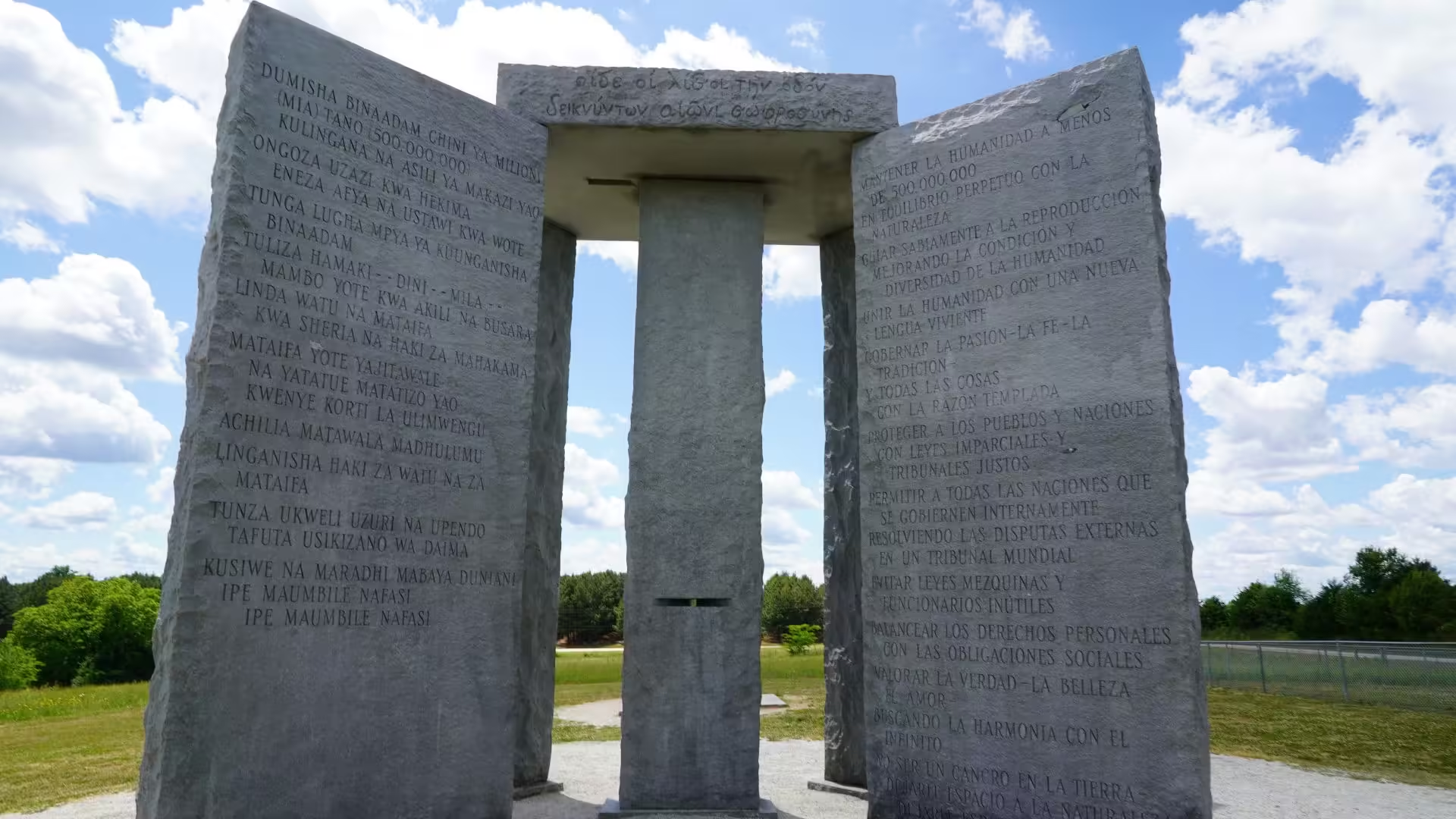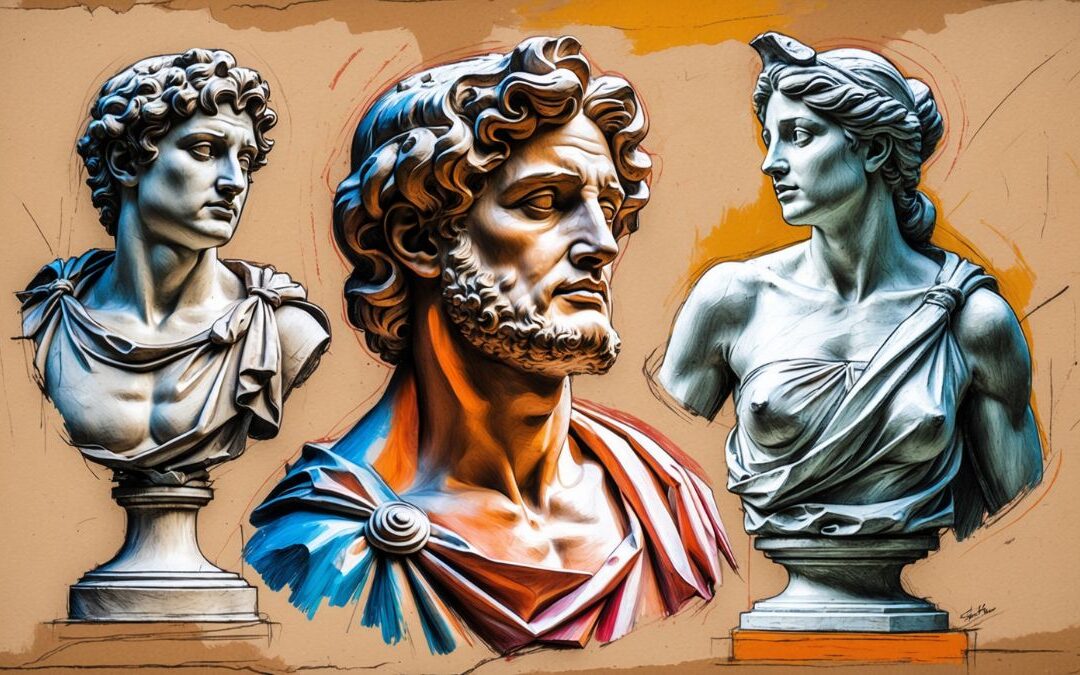- What Are the Georgia Guidestones?
- The Cryptic Messages on the Stones
- Real-Life Relevance: Why Do the Georgia Guidestones Matter?
- The Controversy: Conspiracy Theories and Speculation
- Real-Life Examples: Lessons from the Stones
- Take Action: What Can We Learn from the Georgia Guidestones?
- Expand Your Vocabulary
- Let’s Talk
The Georgia Guidestones have been called “America’s Stonehenge,” but unlike their ancient counterpart, these mysterious stones are a recent addition to the world of enigmatic monuments. Standing tall in Elbert County, Georgia, this granite structure has sparked fascination, speculation, and even controversy since its unveiling in 1980. But what exactly are the Georgia Guidestones, and why do they matter to us today?
What Are the Georgia Guidestones?
The Georgia Guidestones are a massive granite monument, made up of four vertical slabs standing over 19 feet tall, with a central column and a capstone on top. Inscribed on the stones in eight modern languages (including English, Spanish, Swahili, and Chinese) and four ancient ones (such as Babylonian cuneiform and classical Greek) are ten cryptic guidelines for humanity.
The identity of the person who commissioned the structure remains a mystery. In 1979, a man using the pseudonym “R.C. Christian” hired a local granite company to build this structure. To this day, no one knows for sure who he was or what organization, if any, he represented.
The Cryptic Messages on the Stones
Perhaps the most captivating aspect of the Georgia Guidestones are the ten inscriptions that many have debated and analyzed. Some of the messages seem fairly reasonable at first glance, while others have raised eyebrows and concerns.
- Maintain humanity under 500,000,000 in perpetual balance with nature.
- Guide reproduction wisely, improving fitness and diversity.
- Unite humanity with a living new language.
- Rule passion, faith, tradition, and all things with tempered reason.
- Protect people and nations with fair laws and just courts.
- Let all nations rule internally, resolving external disputes in a world court.
- Avoid petty laws and useless officials.
- Balance personal rights with social duties.
- Prize truth, beauty, love—seeking harmony with the infinite.
- Be not a cancer on the Earth—Leave room for nature—Leave room for nature.
These guidelines have stirred much debate. Some see them as a roadmap to a utopian future, while others view them with suspicion, interpreting them as an elitist manifesto or worse, a set of rules for a post-apocalyptic world. But regardless of how you interpret these messages, they seem to carry an underlying theme: the preservation of humanity and the Earth.
Real-Life Relevance: Why Do the Georgia Guidestones Matter?
On the surface, the Guidestones may seem like an odd, cryptic monument. However, they touch on several critical issues that are just as relevant today as they were when the stones were erected.
- Environmental sustainability: The first and last messages on the stones emphasize balance with nature, a topic that is becoming ever more urgent as we face climate change and environmental degradation. The call to “leave room for nature” speaks to the importance of sustainability—something that has become a global focus as we rethink how we live on Earth.
- Global cooperation: Another key theme is global unity and cooperation. With messages about uniting humanity through a common language and resolving international disputes through a world court, the stones reflect ideals of global governance that remain elusive but increasingly necessary in our interconnected world. Whether in terms of climate agreements or trade negotiations, international cooperation is critical to solving many of today’s problems.
- Ethical and societal debates: The more controversial guidelines—such as the directive to maintain the human population under 500 million—have sparked ethical debates about population control, eugenics, and elitism. Though the specifics of this guideline are unsettling to many, it does prompt larger questions about the future of humanity, resource distribution, and how we manage overpopulation in a world with finite resources.
The Controversy: Conspiracy Theories and Speculation
Not everyone sees the Georgia Guidestones as a positive message for humanity. In fact, conspiracy theories abound. Some believe the inscriptions represent the agenda of a secret elite group working behind the scenes to shape the future of the world.
The guideline to keep the population under 500 million, in particular, has fueled speculation about a hidden agenda for population reduction, often linked to fears of government control or a new world order. Others interpret the monument’s emphasis on balance with nature as an eco-fascist message.
Still, the true purpose of the stones remains unknown. Was it a well-meaning guide to a better future, a warning about human civilization’s potential collapse, or something else entirely? Until we know more about R.C. Christian and his motives, the Georgia Guidestones will continue to inspire both wonder and suspicion.
Real-Life Examples: Lessons from the Stones
While the Georgia Guidestones remain shrouded in mystery, they offer real-life lessons if we examine them closely.
For instance, take the message to “balance personal rights with social duties.” This is something we encounter in everyday life. Whether it’s wearing a mask during a pandemic or participating in a democratic vote, balancing individual freedom with responsibility to society is a challenge every generation must navigate.
Or consider the instruction to “prize truth, beauty, love—seeking harmony with the infinite.” This speaks to our deeper human need for purpose and connection, which can get lost in the chaos of modern life. The reminder to seek harmony with the infinite can inspire us to slow down and reflect on what truly matters—our relationships, our impact on the world, and our place in the grand scheme of things.
Take Action: What Can We Learn from the Georgia Guidestones?
The Georgia Guidestones, despite their controversy and mystery, invite us to reflect on the direction humanity is headed. The issues they address—environmental sustainability, global cooperation, personal responsibility—are urgent and require action.
Now that you’ve learned about the Guidestones, what can you do? Start by examining your own life. How can you strike a better balance between your rights and your duties? How can you contribute to a healthier relationship with nature? What role can you play in encouraging truth, beauty, and love in your community?
The mystery of the Georgia Guidestones may never be solved, but the questions they raise are clear. Take time to think about them, and let those questions inspire positive action in your own life.
By examining this fascinating monument, we see that even cryptic messages from an anonymous source can spark deep reflections about humanity’s path. Stay curious, stay informed, and take action to ensure that the future we build aligns with the ideals of sustainability, cooperation, and compassion.
Expand Your Vocabulary
- Monument
A monument is a structure built to commemorate a person, event, or idea. In the context of the Georgia Guidestones, the term refers to the granite slabs that stand as a mysterious symbol. In everyday life, monuments can be statues, memorials, or other landmarks like the Lincoln Memorial, serving as physical reminders of important events or figures in history. - Inscriptions
Inscriptions are words or symbols engraved on a surface, typically stone or metal. In the article, the Georgia Guidestones are described as having inscriptions in multiple languages. You often find inscriptions on plaques, memorials, or even gravestones, where they convey important messages or memorialize individuals. - Cryptic
Cryptic means something that is mysterious or difficult to understand. The inscriptions on the Guidestones are described as cryptic because their full meaning is unclear. In everyday conversations, someone might say, “His message was cryptic,” if a note or statement is puzzling and hard to interpret. - Sustainability
Sustainability refers to the ability to maintain or support something over the long term, especially concerning the environment. In the article, the term is used to highlight the Guidestones’ message about balancing humanity with nature. In real life, sustainability is often discussed in terms of eco-friendly practices like recycling or using renewable energy. - Conspiracy theories
A conspiracy theory is a belief that certain events or situations are secretly manipulated by powerful groups. In the article, conspiracy theories emerge surrounding the true purpose of the Georgia Guidestones. In everyday language, conspiracy theories often appear in discussions about government actions, historical events, or unexplained phenomena. - Population control
Population control refers to efforts aimed at regulating or managing the growth of a population. One of the more controversial inscriptions on the Guidestones addresses maintaining a lower global population. In daily life, population control is discussed in relation to policies like family planning or resource management. - Global cooperation
Global cooperation means different nations working together towards common goals. The Georgia Guidestones advocate for international unity, which touches on issues like climate change, global health, or trade agreements. In daily conversations, global cooperation can refer to international efforts, such as joint missions to combat pandemics. - Utopia
Utopia refers to an imagined perfect society where everything is ideal and harmonious. The Guidestones have been interpreted by some as a roadmap to a utopia. People often use the term when talking about idealistic visions of the future, for example, “We aim to create a utopia where poverty and inequality no longer exist.” - Eugenics
Eugenics is the controversial idea of improving a population through controlled breeding to increase desirable traits. The guideline about guiding reproduction on the Georgia Guidestones brings up this concept. Though largely discredited today, the term is sometimes used to describe historical or scientific debates about genetics and human evolution. - Elitism
Elitism refers to the belief that a society or system should be led by a select group of people with superior qualities, wealth, or influence. In the context of the Georgia Guidestones, some have interpreted the guidelines as promoting elitist ideas. In everyday conversation, people use this term when referring to groups or individuals who consider themselves better or more privileged than others, for example, “The company’s management seems to practice elitism by only hiring from prestigious universities.”
Let’s Talk
- The Georgia Guidestones present a list of guidelines for humanity. Do you believe these guidelines were intended as a roadmap for a utopian society, or do you see them as something else? Why?
- How do you interpret the message about maintaining humanity under 500 million people? Do you think population control is a necessary conversation for the future, or is it too controversial?
- The call for global cooperation in the Guidestones is an ideal many strive for today. Do you think international unity is achievable, and what obstacles do you believe prevent it from happening?
- What are your thoughts on conspiracy theories regarding monuments like the Georgia Guidestones? Do you think they stem from valid concerns, or are they a product of misinformation and fear?
- The stones emphasize balancing personal rights with social duties. How do you see this balance playing out in your own life or in your community? Do you think people are generally good at finding that balance?
- Some people see the inscriptions on the Guidestones as elitist or even dangerous. What are the ethical responsibilities of those who create public messages that could shape society’s beliefs or behaviors?
- Consider the environmental focus of the stones. With climate change and sustainability becoming critical topics, do you think monuments like these can inspire positive action, or are they too cryptic to have a real impact?
- If the purpose behind the Georgia Guidestones remains forever unknown, do you think the mystery itself is important, or is understanding the creator’s intent essential for us to learn from them?
Take these questions to your next discussion with friends or family, or reflect on them yourself to explore deeper thoughts about the mystery and significance of the Georgia Guidestones.











0 Comments